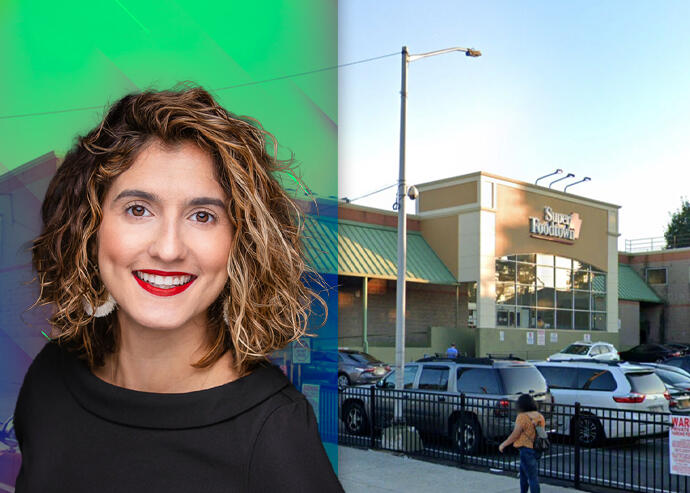
Marjorie Velázquez, Dem. nominee for 13th council district and 2945-65 Bruckner (Mvalez.nyc, Google Maps)
Marjorie Velázquez will not join the City Council until January, but she’s already shaping the conversation around development in the Bronx.
Velázquez, the progressive Democrat widely expected to replace Councilman Mark Gjonaj in January, announced last week she had struck a deal with developers to halt a rezoning along Bruckner Avenue until the next Council takes office. (Most incumbents are being forced out by term limits.)
Velázquez is framing the agreement as an early political win, but in reality, the developers filed their rezoning application too late for it to reach Gjonaj before his final day in office, Dec. 31.
In July, local developers Peter and Joseph Bivona asked the city to rezone four blocks in Schuylerville, a low-density neighborhood near Throggs Neck, so they could build 320,000 square feet of commercial and residential space spread across four mixed-use buildings. The development would have created 339 apartments, 94 of them affordable to households earning 80 percent of the area median income.
The largest piece of the project would be an eight-story mixed-use building at 2945-65 Bruckner Boulevard. It would stack 139 apartments above a 17,000-square-foot grocery store, replacing a one-story Foodtown.
The Bivonas purchased the Foodtown lot in March 2001, public records show. Though the deed doesn’t show a price, they took out a $1.7 million mortgage for the property the same day.
Now their plan is in limbo and will have to pass muster with a new administration, likely led by Eric Adams, who ran on a pro-development platform but does not always side with projects. More importantly, they will need Velázquez’s support, as the Council traditionally lets the local member decide zoning matters.
“As I have said previously, I am against this project in its current form,” Velázquez said in a press release. “I’m concerned about the addition of over 300 new units in an area that has not been well served by public infrastructure, and I will fight to demand the investment needed in our community.”
While the delay is no doubt a setback to the developers, they faced a nearly-impossible timeline to get approval before she takes office.
The Bivonas submitted their application at the end of July. That left it little chance to squeeze through the city’s land-use review process, which often takes months to begin and then runs up to its seven-month time limit, this year. It didn’t help that city planners are mired in a backlog of rezoning applications.
The Bivonases’ application has yet to be certified by the Department of City Planning, which would start the public review process known by its acronym Ulurp. The timing likely had nothing to do with Velázquez, as the developers would have fared much better had their request been decided by the pro-business Gjonaj.
The project’s zoning hurdle dates back to 2004, the city downzoned the area and added it to its Low Density Growth Management Areas, which otherwise regulates development in sprawling sections of Staten Island. Those neighborhoods feature higher parking requirements, minimum yard sizes and incentives for in-home garages.
What new zoning Velázquez will approve remains unknown. Her campaign platform doesn’t mention housing and she did not respond to requests for comment.
However, Velázquez has criticized Gjonaj for his real estate ties, and her website says she fought “against overdevelopment” as a community board member. (Gjonaj’s parents started a Morris Park real estate firm that he took over before joining the City Council.)
“My community has been desperately advocating to have their voices heard and a seat at the table,” Velázquez said in the release. “But, to this point their voices have fallen on deaf ears.”
When called at work, Joseph Bivona wasn’t in the office. Peter Bivona couldn’t be reached.



